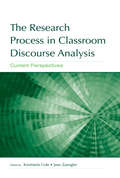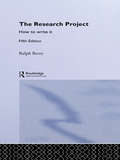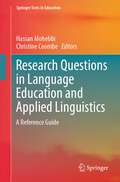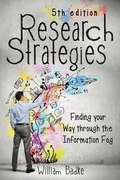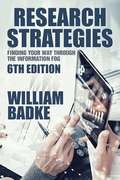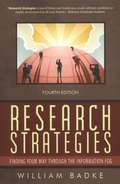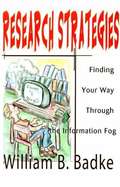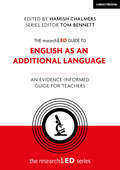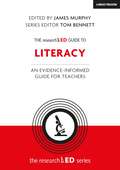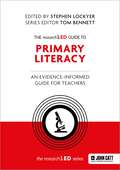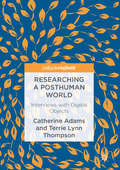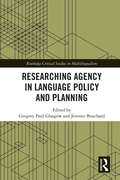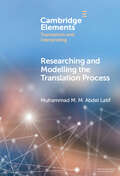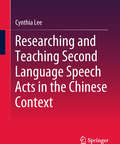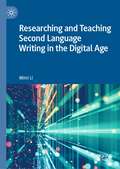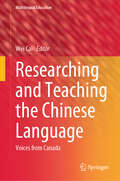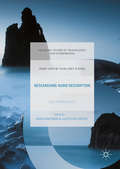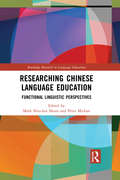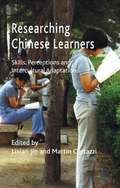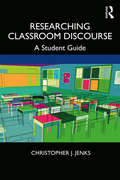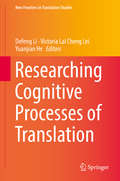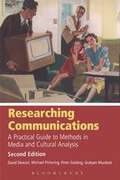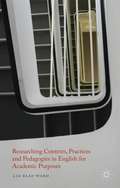- Table View
- List View
The Research Process in Classroom Discourse Analysis: Current Perspectives
by KimMarie Cole • Jane ZuenglerThis volume gives intellectual space to a range of current perspectives on classroom discourse research and provides a forum for conversations about the research process. Classroom discourse researchers from different theoretical perspectives provide five separate analyses of the same instructional unit in a high school biology class, using the same set of data. Interwoven with the five research reports are several conversations among the editors and researchers regarding specific aspects of the research process. These conversations illuminate some of the actual decisions that researchers make when looking at data and crafting their analyses. This book is intended for graduate students, researchers, and teacher educators across the fields of applied linguistics and education who are interested in studying classroom discourse and, more generally, language-in-use. With its focus on both the research process and the outcomes of research, as well as on the theory-method relationship, this book is relevant for courses in research methodology, language in education, applied linguistics, discourse analysis, language development, and multiculturalism in the classroom.
The Research Project: How to Write It
by Ralph BerryNow in its fifth edition, this guide to project work continues to be an indispensable resource for all students undertaking research.Guiding the reader right through from preliminary stages to completion, The Research Project: How to write it sets out in clear and concise terms the main tasks involved in doing a research project, covering:* choosing a topic* using the library effectively* taking notes* shaping and composing the project* providing footnotes, documentation and a bibliography* avoiding common pitfalls.Fully updated throughout, this new edition features a chapter on making the most out of the Internet, from knowing where to start, to assessing the quality of the material found there. Other features include a model example of a well researched, clearly written paper with notes and bibliography and a chapter on getting published in a learned journal for more advanced researchers.Whether starting out or experienced in research, The Research Project: How to write it is an essential tool for success.
Research Questions in Language Education and Applied Linguistics: A Reference Guide (Springer Texts in Education)
by Hassan Mohebbi Christine CoombeThis volume encompasses the range of research questions on language-related problems that arise in language teaching, learning and assessment. The [150] chapters are written by experts in the field who each offer their insights into current and future directions of research, and who suggest several highly relevant research questions. Topics include, but are not limited to: language skills teaching, language skills assessment and testing, measurement, feedback, discourse analysis, pragmatics, semantics, language learning through technology, CALL, MALL, ESP, EAP, ERPP, TBLT, materials development, genre analysis, needs analysis, corpus, content-based language teaching, language teaching and learning strategies, individual differences, research methods, classroom research, form-focused instruction, age effects, literacy, proficiency, and teacher education and teacher development. The book serves as a reference and offers inspiration to researchers and students in language education. An important skill in reviewing the research literature is following a study’s “plan of attack.” Broadly, this means that before accepting and acting upon the findings, one considers a) the research question (Is it clear and focused? Measurable?), b) the subjects examined, the methods deployed, and the measures chosen (Do they fit the study’s goal and have the potential to yield useful results?), and c) the analysis of the data (Do the data lead to the discussion presented? Has the author reasonably interpreted results to reach the conclusion?). Mohebbi and Coombe’s book, Research Questions in Language Education and Applied Linguistics: A Reference Guide, helps budding researchers take the first step and develop a solid research question. As the field of language education evolves, we need continual research to improve our instructional and assessment practices and our understanding of the learners’ language learning processes. This book with its remarkable 150 topics and 10 times the number of potential research questions provides a wealth of ideas that will help early career researchers conduct studies that move our field forward and grow our knowledge base. Deborah J. Short, Ph.D., Director, Academic Language Research & Training, Past President, TESOL International Association (2021-22)As a teacher in graduate programs in TESOL I frequently come across the frustration of students at centering their research interests on a particular topic and developing research questions which are worth pursuing so as to make a contribution to the field. This frustration stems from the fact that our field is so vast and interrelated, that it is often impossible to properly address all that interests them. Hence, I wholeheartedly welcome this most relevant and innovative addition to the research literature in the field of TESOL and Applied Linguistics. Coombe and Mohebbi have created a real tour de force that stands to inform budding researchers in the field for many years to come. Additionally, the cutting-edge depiction of the field and all it has to offer will no doubt update the research agendas of many seasoned researchers around the world. The 150 chapters are organized in a most powerful, yet, deceptively simple way offering a positioning within the topic, suggesting questions that might direct inquiry and offering a basic set of bibliographic tools to start the reader in the path towards research. What is more, the nine sections in which the chapters are organized leave no area of the field unexplored. Dr. Gabriel Díaz Maggioli, Academic Advisor, Institute of Education, Universidad ORT del Uruguay, President, IATEFL
Research Strategies: Finding Your Way through the Information Fog
by William BadkeOnline resources have given us access to more knowledge than ever before. We're buried in data, and defining what is and what is not genuine information becomes more of a challenge all the time. In this fifth edition of Research Strategies, author William Badke helps you make sense of all of the available information, shows you how to navigate and discern it, and details how to use it to your advantage to become a better researcher. Badke focuses on informational research and provides a host of tips and advice not only for conducting research, but also for everything from finding a topic to writing an outline to documenting resources and polishing the final draft. Study guides, practice exercises, and assignments at the end of each chapter help reinforce each lesson. An experienced research instructor who has led thousands of students to become better researchers, Badke uses humor to help you gain a better understanding of today's complex, technological world. Research Strategies provides the skills and strategies to efficiently and effectively complete a research project from topic to finished product. It shows how research can be exciting and even fun.
Research Strategies: Finding Your Way Through The Information Fog (Sixth Edition)
by William BadkeWe live in a time when there is more knowledge available to us than ever before. Yet we struggle to make sense of it. When a research deadline looms and all you see is a confusing fog of data, you know you need help. In this sixth edition of Research Strategies, author William Badke helps you make sense of it all. He will show you how to navigate the information fog intelligently, and he will detail how to use it to your advantage to become a better researcher. Badke focuses on informational research and provides a host of tips and advices not only for conducting research, but also for everything from finding a topic to writing an outline to locating high quality, relevant resources to finishing the final draft. Study guides, practice exercises, and assignments at the end of each chapter will help reinforce the lessons. As an experienced researcher who has led thousands of students to ramp up their research abilities, Badke uses humor to help you gain a better understanding of today's world of complex technological information. Research Strategies provides the skills and strategies to efficiently and effectively complete a research project from topic to final product.
Research Strategies: Finding Your Way Through the Information Fog 4th Edition
by William BadkeBecause of the dynamic nature of the Internet, any web addresses or links contained in this book may have changed since publication and may no longer be valid. The views expressed in this work are solely those of the author and do not necessarily reflect the views of the publisher, and the publisher hereby disclaims any responsibility for them.
Research Strategies: Finding Your Way Through the Information Fog
by William B. BadkeFilled with time-tested strategies and expert advice, Research Strategies teaches you the skills that are essential to the success of any research project.
The researchED Guide to English as an Additional Language: An evidence-informed guide for teachers (researchED)
by Tom Bennett Hamish ChalmersIn this edition, Hamish Chalmers provides a primer on the key questions teachers and researchers have about the education of children learning English as an Additional Language (EAL). From the general implications of teaching children in a language that many are still in the process of learning, to the specifics of EAL-friendly pedagogy, this volume includes contributions from both teachers and researchers in the field: Victoria Murphy, Constant Leung, Jonathan Bifield, Feyisa Demie, Ann-Margaret Smith, Naomi Flynn, Holly Joseph, Tracey Costley, Xiao Lan Curdt-Christiansen, and Eowyn Crisfield.Hamish Chalmers is a lecturer and EAL researcher at the University of Oxford, vice-chair of NALDIC — the UK’s EAL subject association — and erstwhile primary school teacher, both in the UK and overseas.
The researchED Guide to English as an Additional Language: An evidence-informed guide for teachers (researchED)
by Hamish Chalmers Tom BennettIn this edition, Hamish Chalmers provides a primer on the key questions teachers and researchers have about the education of children learning English as an Additional Language (EAL). From the general implications of teaching children in a language that many are still in the process of learning, to the specifics of EAL-friendly pedagogy, this volume includes contributions from both teachers and researchers in the field: Victoria Murphy, Constant Leung, Jonathan Bifield, Feyisa Demie, Ann-Margaret Smith, Naomi Flynn, Holly Joseph, Tracey Costley, Xiao Lan Curdt-Christiansen, and Eowyn Crisfield.Hamish Chalmers is a lecturer and EAL researcher at the University of Oxford, vice-chair of NALDIC — the UK’s EAL subject association — and erstwhile primary school teacher, both in the UK and overseas.
The researchED Guide to Literacy: An evidence-informed guide for teachers (researchED)
by James Murphy Tom BennettresearchED is an educator-led organisation with the goal of bridging the gap between research and practice. This accessible and punchy series, overseen by founder Tom Bennett, tackles the most important topics in education, with a range of experienced contributors exploring the latest evidence and research and how it can apply in a variety of classroom settings.In this edition, James Murphy examines the latest evidence surrounding student literacy, editing contributions from a wide range of writers.
The researchED Guide to Primary Literacy: An evidence-informed guide for teachers
by Stephen LockyerresearchED is an educator-led organisation with the goal of bridging the gap between research and practice. This accessible and punchy series, overseen by founder Tom Bennett, tackles the most important topics in education, with a range of experienced contributors exploring the latest evidence and research and how it can apply in a variety of classroom settings.Literacy is one of the most powerful and transformative learning tools: making changes and improvements in Literacy will have a direct impact on your work, your learning and your aspirations across all subjects in the curriculum.In this book, Stephen Lockyer brings together contributions from expert writers, including Clare Sealy, Emma Stokes, Neil Almond and Andrew Percival, to show how making tiny, incremental changes with consistency and genuine purpose can have a big effect on your students, their literacy, and their learning. Each chapter has an abundance of ideas to take into your classroom and have a direct impact on the pupils.
The researchED Guide to Primary Literacy: An evidence-informed guide for teachers
by Stephen LockyerresearchED is an educator-led organisation with the goal of bridging the gap between research and practice. This accessible and punchy series, overseen by founder Tom Bennett, tackles the most important topics in education, with a range of experienced contributors exploring the latest evidence and research and how it can apply in a variety of classroom settings.Literacy is one of the most powerful and transformative learning tools: making changes and improvements in Literacy will have a direct impact on your work, your learning and your aspirations across all subjects in the curriculum.In this book, Stephen Lockyer brings together contributions from expert writers, including Clare Sealy, Emma Stokes, Neil Almond and Andrew Percival, to show how making tiny, incremental changes with consistency and genuine purpose can have a big effect on your students, their literacy, and their learning. Each chapter has an abundance of ideas to take into your classroom and have a direct impact on the pupils.
Researching a Posthuman World: Interviews with Digital Objects
by Catherine Adams Terrie Lynn ThompsonThis book provides a practical approach for applying posthumanist insights to qualitative research inquiry. Adams and Thompson invite readers to embrace their inner – and outer – cyborg as they consider how today’s professional practices and everyday ways of being are increasingly intertwined with digital technologies. Drawing on posthuman scholarship, the authors offer eight heuristics for “interviewing objects” in an effort to reveal the unique – and sometimes contradictory – contributions the digital is making to work, learning and living. The heuristics are drawn from Actor Network Theory, phenomenology, postphenomenology, critical media studies and related sociomaterial approaches. This text offers a theoretically informed yet practical approach for asking critical questions of digital and non-digital things in professional and personal spaces, and ultimately, for considering the ethical and political implications of a technology mediated world. A thought-provoking and innovative study, this book will be of great interest to scholars and researchers of technology studies, digital learning, and sociology.
Researching Agency in Language Policy and Planning (Routledge Critical Studies in Multilingualism)
by Gregory Paul Glasgow Jeremie BouchardThis concise collection features seven studies on agency in language policy and planning across five different national contexts. Building on themes explored in Agency in Language Policy and Planning, this volume highlights the complex relationship between agency and broader ideological discourses, integrating social theory toward contributing to and enhancing growing scholarship on language policy and planning. This book will be of particular interest to students and scholars in language policy and planning, language and education, critical sociolinguistics, and applied linguistics.
Researching and Modelling the Translation Process (Elements in Translation and Interpreting)
by Muhammad M. LatifTranslation process research is almost four decades old. Translator cognition is one of the most complex translation research areas to study. This complexity stems mainly from the difficulties involved in collecting and analyzing translation process data. The Element reviews and discusses the developments in translation process research. Specifically, it highlights the key terms in translation process research, its data sources, the developments this area has witnessed in four decades, and the efforts made in modelling the translation process so far. The work also proposes a translation process model which shows the central role monitoring plays in managing other translation subprocesses and evaluating the information being processed. Based on the issues reviewed and discussed, it is concluded that translation process research is still maturing. Making further developments in this translation research area requires addressing some contextual and methodological gaps, and investigating particular neglected research dimensions.
Researching and Teaching Second Language Speech Acts in the Chinese Context
by Cynthia LeeThis book contributes to the literature of interlanguage pragmatics by building an interface between researching and teaching speech acts in the Chinese context. It is written for researchers, language educators, classroom teachers and readers who are interested in interlanguage pragmatics research, acquisition and teaching, with particular reference to speech acts performed by Chinese learners of English, and their relationships with the learners’ first language and cultural concepts. It provides a more advanced understanding of the production and development of speech acts of Chinese learners of English from the cross-linguistic, cross-cultural, L1 and L2 developmental perspectives, drawing on relevant second language acquisition theoretical frameworks. It also recommends research-informed pedagogies that are applicable to other learners of English.
Researching and Teaching Second Language Writing in the Digital Age
by Mimi LiThis book presents a comprehensive approach to issues related to researching and teaching second language (L2) writing in digital environments. In the digital age, new technologies have revolutionized the ways we communicate and construct knowledge, and have also reshaped the traditional notions of writing and literacy, posing new challenges and opportunities for L2 teachers and students. This book provides up-to-date coverage of the main areas of L2 writing and technology, including digital multimodal composing, computer-mediated collaborative writing, online teacher and peer feedback, automated writing evaluation, and corpus-based writing instruction. It synthesizes the relevant literature, analyzes theoretical perspectives, compiles relevant resources, and offers research and pedagogical recommendations to guide scholars in undertaking new L2 writing research and instructional practice in technologically-supported educational contexts. This book will be of relevance and interest to researchers, language teachers, and graduate students in applied linguistics and education.
Researching and Teaching the Chinese Language: Voices from Canada (Multilingual Education #47)
by Wei CaiThis book offers an in-depth exploration of the unique landscape of Chinese language learning and teaching in Canada. It is the first to highlight the distinctive features of Chinese language education in the country and to introduce the Canadian approach to teaching and researching Chinese language, termed the "Canadian school of Chinese education." This approach, largely unfamiliar to the global academic community, is illuminated in this book, filling a critical gap in the literature and providing a platform for Canadian voices and perspectives in the field. The book delves into original and under-investigated areas, addressing important issues in Chinese teaching and learning that require more sophisticated research approaches due to advancements in our understanding and the discovery of complex Chinese learner populations. Structured into four sections, the book offers an overview of Chinese language education in Canada, examines comparisons of learning conditions, explores interactive dynamics and communication strategies, and delves into social and cultural dimensions. This book will be invaluable to researchers, instructors, advanced-level undergraduate students, and graduate students in the field of Chinese language learning and teaching.
Researching Audio Description
by Anna Matamala Pilar OreroAudio description is one of the many services available to guarantee accessibility to audiovisual media. It describes and narrates images and sounds and resulting audio is then mixed with the original soundtrack. Audio description is a complex process that touches production, distribution and reception. Researching Audio Description: New Approachesgathers academic information and data from the many existing research projects, practices, and training across the world. The book has a telescopic approach, from two introductory chapters where accessibility in general is contextualised as a human right, and the basic concepts of disability and impairment are explored. Research on specific features for audio description script drafting are focused in the second part of the book, with a view to revising existing funded projects and their outcomes. The book offers a wealth of information on both the practical and philosophical, from different approaches in perception and cognition, and different research methodologies. Project information contained in the contributions identifies trends in current research-funded studies which will be valuable as a pointer towards future proposals. The book shows the dynamic state of audio description practice, training and research, while contributing towards the growing critical mass needed in building the field of accessibility studies.
Researching Chinese Language Education: Functional Linguistic Perspectives (Routledge Research in Language Education)
by Mark Shiu-kee Shum Peter MickanThe culmination of more than a decade of research, this compelling volume offers a fresh approach for applying functional linguistics to assess student performance, to inform the teaching and learning of Chinese and to design curriculum and teaching materials. Documenting authentic systemic functional linguistics (SFL) studies in researching and teaching Chinese as a first or second language, this research is set in the multilingual settings of Hong Kong and Australia. The experiences of SFL and genre teaching in English have been well demonstrated as valid, viable and practical in different contexts; however this volume covers the relatively new domain of research into the applications of SFL to the teaching of Chinese. Using SFL as the research framework, the authors cover three major areas in Chinese language education: effective pedagogies, curriculum and material design, and text analysis. Covering major local curriculum reforms and the rapid growth of International Baccalaureate programmes worldwide, this book will be of interest to linguists, language teachers and teacher educators and those involved in the teaching and learning of Chinese around the world.
Researching Chinese Learners
by Lixian Jin Martin CortazziThis collection focuses on Chinese learners with original data sets using innovative research methods. It investigates Chinese learners' learning and language skills, perceptions and particularly the processes of reciprocal intercultural adaptations in a wide international context of Australia, Canada, China, Hong Kong, New Zealand and the UK.
Researching Classroom Discourse: A Student Guide
by Christopher J. JenksThis practical guide to doing classroom discourse research provides a comprehensive overview of the research process. Bringing together both discourse analysis and classroom discourse research, this book helps readers to develop the analytic and rhetorical skills needed to conduct, and write about, the discourse of teaching and learning. Offering step-by-step guidance, each chapter is written so that readers can put the theoretical and methodological issues of classroom discourse analysis into practice while writing an academic paper. Chapters are organized around three stages of research: planning, analyzing, and understanding and reporting. Reflective questions and discourse examples are used throughout the book to assist readers. This book is essential reading for modules on classroom discourse or thesis writing and a key supplementary resource for research methods, discourse analysis, or language teaching and learning.
Researching Cognitive Processes of Translation (New Frontiers in Translation Studies)
by Defeng Li Victoria Lai Lei Yuanjian HeThis edited volume covers an array of the most relevant topics in translation cognition, taking different approaches and using different research tools. It explores theoretical and methodological issues using case studies and examining their practical and pedagogical implications. It is a valuable resource for translation studies scholars, graduate students and those interested in translation and translation training, enabling them to conceptualize translation cognition, in order to enhance their research methods and designs, manage innovations in their translation training or simply understand their own translation behaviours.
Researching Communications: A Practical Guide to Methods in Media and Cultural Analysis
by David Deacon Michael Pickering Peter Golding Graham MurdockThe new edition of the highly respected Researching Communications is a comprehensive and authoritative guide to researching media and communication. Introducing the major research methods, giving detailed examples of research analysis and practical step-by-step guidance in clear language, Researching Communications, Second Edition is an invaluable guide to performing and analyzing research tasks. Written by highly regarded experts in the field, the new edition includes expanded and updated sections on the Internet, online databases and the latest CAQDAS packages, as well as new case studies, international examples, and details of recent developments in media and communication studies. Undergraduate and postgraduate media- and communication-studies students will find Researching Communications an invaluable resource at all stages of their course.
Researching Contexts, Practices and Pedagogies in English for Academic Purposes
by Lia Blaj-WardThis book is a point of reference for EAP professionals planning to conduct or commission research into learning, teaching, professional development or quality assurance in EAP. It draws on academic and professional debates to inspire further research and practical initiatives to enhance EAP provision.
